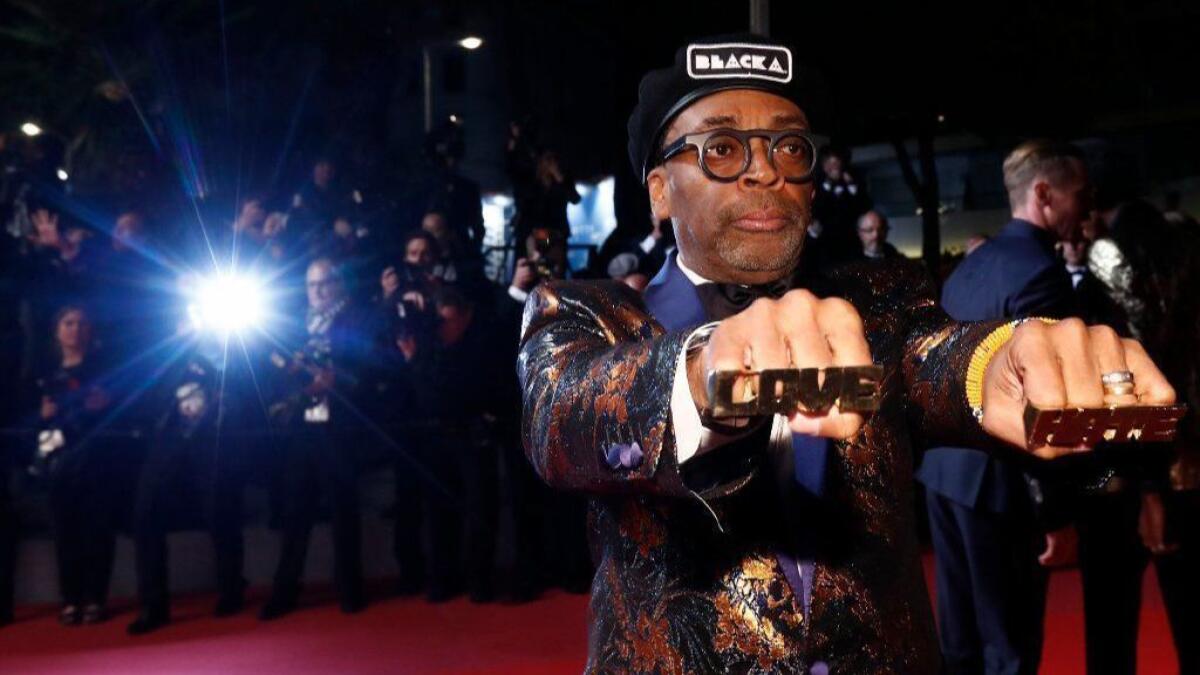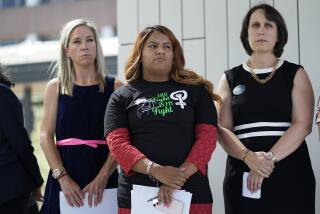Spike Lee’s ‘BlacKkKlansman’ brings Cannes Festival audience to their feet with commentary on Trump’s America

Standing ovations at the Cannes Film Festival are no rarity — the audiences at the black-tie gala screenings have gained a reputation for being generous. But when the credits start to roll at the Auditorium Louis Lumière, differentiating between obligatory and genuine enthusiasm is easier than you might expect.
When the crowd rose to its feet to fete Spike Lee’s newest film, “BlacKkKlansman,” on Monday night, there was no question: This was the real deal. The movie, based on the true story of an African American cop who went undercover to infiltrate the Ku Klux Klan, was the first American film vying for the Palme D’Or to screen at the festival — nearly a week after the event began on May 8. (The only other U.S. film in competition, David Robert Mitchell’s “Under the Silver Lake,” will debut on Tuesday.)
Little was known about Lee’s latest movie, which was just completed at the end of 2017, before its premiere this week. A brief snippet of footage was shown to movie theater owners at CinemaCon in Las Vegas last month, and a trailer dropped just hours before the movie was unveiled to audiences in the south of France.
The film is set in 1979, where detective Ron Stallworth became the first black member of the Colorado Springs police force. The cop (played by John David Washington, Denzel’s son) teams up with a white Jewish investigator (Adam Driver), and together the two become so enmeshed in the KKK that they even strike up a friendship with former Grand Wizard David Duke (Topher Grace).
Though the movie’s plot unfolded nearly four decades ago, Lee draws stark parallels between the situation in Colorado and the Trump administration. Duke, in particular, is used as a sort of cipher for Trump, talking about his political ambitions and how he hopes America can return to a sort of “greatness.” The film concludes with actual footage from last summer’s events in Charlottesville, Va., where a KKK rally spurred riots, leaving three dead and 38 injured; the final image on screen is of an upside-down American flag that morphs from red, white and blue to black-and-white.
Focus Features will release the film in U.S. theaters on Aug. 10, in time for the one-year anniversary of the Charlottesville riots.
“I kind of don’t want to go back to America now,” one filmgoer muttered upon exiting the theater.
Lee, sporting one black and one white Nike sneaker, walked the red carpet with his arms outstretched, showing off brass knuckle rings that read “love” and “hate.” “Brooklyn in the house!” he yelled to the crowd before taking his seat.
The director’s 1989 film “Do the Right Thing” was up for the Palme D’Or in 1989 but didn’t win, and the filmmaker told the Hollywood Reporter last month that he felt he was “robbed” of the prize — which ultimately went to Steven Soderbergh’s “sex, lies and videotape” — because jury president Wim Wenders didn’t like it.
At the party for “BlacKkKlansman,” held at a pop-up nightclub just a walk down the beach from the theater, Lee spent the evening holed up next to his wife in a booth, scrolling through his cellphone. If he was looking for early reviews, those posted online shortly following the premiere were largely positive: Variety called it “the best thing the director has made in a dozen years,” while Vulture said it was “one of his most flat-out entertaining films in years, and also one of his most uncompromising.”
The film’s young star, Washington, was in a more overtly celebratory mood, suggesting a champagne toast with the numerous members of his family who had flown to France to support him. (His father was unable to attend due to his role in Broadway’s “The Iceman Cometh.”)
“I didn’t know what to expect, and this felt amazing. I’ve played football, but I’ve never felt anything like that,” said the actor, who signed as a free agent with the St. Louis Rams in 2006. “I always heard they’re silent or they stand up and clap, so I’m glad it was the latter.”
Follow me on Twitter @AmyKinLA
More to Read
Only good movies
Get the Indie Focus newsletter, Mark Olsen's weekly guide to the world of cinema.
You may occasionally receive promotional content from the Los Angeles Times.











